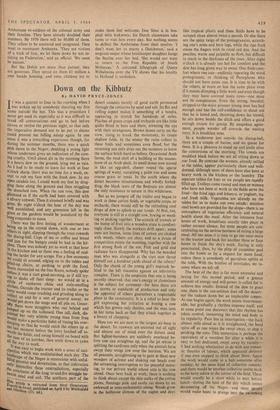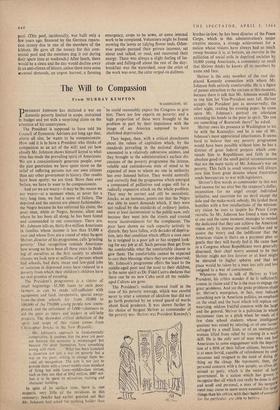Down on the Kibbutz
KY DAVID PRYCE-JONES
I-r was a quarter to four in the morning When I was woken up by somebody shouting my first name outside the hut. This was a procedure I never got used to, especially as it was difficult to break off conversations and go to bed before eleven or twelve the previous night, so that only the imperative demand not to be put to shame could prevent me falling asleep again. In one sense it was a rewarding experience though, for during the summer months, there was a quick Pink dawn in the Negev, shedding a young light whose tenderness gives no indication of the com- ing cruelty. Until about six in the morning there is a heavy dew on the ground, lying wet as rain. As I had to be ready to leave for work at four o'clock sharp, there was no time for a wash, ex- cept to rub my face with the fresh dew. In my °Pen sandals too, I could wash my feet by drag- ging them along the ground and then wriggling the drenched toes. When the sun rose, this dew glistened as if the earth had been covered with a silvery cobweb. Then it steamed briefly and was gone. By eight o'clock the heat of the day was Well established, and any greenness left in the grass or the gardens would be jaundiced by the long crescendo to noon.
There was the first feeling of wonderment at being up in the crystal dawn, with one or two others in sight, slipping through the trees towards the dining-hall. Cups of tea or coffee and bread and jam for the hungry could be had in the kit- chen. There was nobody yet to work at that hour in the kitchen and so there was a feeling of raid- ing the larder for any scraps. For a few moments We could sit around, edging on to the tables and Piled-up chairs, or pushing to grab the food. Boots resounded on the lino floors, nobody spoke unless it was a curt good-morning, as if still try- tng to shake off their sleep: we would sit in a circle of unshaven chins and stale-smelling .elothes. Outside the tractor and its trailer or the lorry would come crashing and grinding along to collect us and by a sort of general assent, we Would put down the mugs and all pile on. Gener- 1Y there were stragglers who ran behind and jil_tn Pod up on the tailboard. One tall, dark, dis- Wointed but very athletic young man from Iraq
s,eould make a particular habit of timing his over- l_ePing so that he would catch the others up at
..waerlast moment before the lorry lurched off to- wards ds the fields, and swing himself on board with ."11,, ease of an acrobat, then settle down to yawn 4",the way to work. _.1:.tW. as easy to begin work with a sense of anti- ',1 ton which was undiminished each day. The
landscape of the Negev is mysterious with unful- filled ,_ .Promise and devastation, so that cultivation °n1Y intensifies these contradictions, especially the
awareness of the long to-and-fro struggle be- oyeet sand and soil. The northern part of the This
article is extracted from Next Generation; Tray •
,„A ..„e,ts In Israel, published on April 6 by Weidenfeld -"" i'llcoson (27s, 6d.).
desert consists mostly of good earth permeated through the centuries by sand and salt. Its flat and rolling aspect makes it something of a tundra, appearing to stretch for hundreds of miles. Patches of green crops and orchards are like little quilts fitted in here and there, arresting the eye with their strangeness. Brown dunes carry on the view, rising to break the monotony, to create shallow folds. in the winter the rains collect in these folds and sometimes even flood, but the returning sun only dries out the moisture to leave the surface brick-hard as before. Occasional Arab farms, the mud shell of a building or the mauso- leum of an Arab sheik, its small dome now stoved in like an egg-shell, cluster round the sparse springs of water, sustaining a palm tree and some coarse grass or reeds. In the south where the desert becomes mountainous and wholly forbid- ding, the black tents of the Bedouin are almost the only resistance to nature in this wilderness.
But as we jumped off the trailer and began to work in these cotton fields, or vegetable crops, or orchards, there would still be the refreshing cool drops of dew to splash to our hands. At first, too, everyone is still in a straight row, hoeing or weed- ing or picking together. The scratch of trowels or the bump of fruit into a wooden crate is comfort- ingly close. Slowly the workers drift apart: some trees are barren, some lines of cotton are choked with weeds, others are clear, and so a strain of competition enters the morning, together with the first strong flush of the sun. Pink and gold and radiance have disappeared. Why has the bearded man who was alongside at the start now thrust himself out a hundred yards ahead of the others? Only the chunk of the young girl's mattock be- hind to the left reassures against an inferiority complex. There is the suspicion that one is being secretly observed, that one's energy or clumsiness is the subject for comment--for here there are no norms or standards of production and only the approval of others guarantees a respectable place in the community. It is a relief to hear the girl expressing her irritation at hoeing a row which has grown only thistles, and the man next to her turns back so that they attack together in a frenzy of chopping.
Here too we are next to the largest air-base in the desert. Its runways are secreted out of sight and almost out of mind over the distant sand.
But fighter-bombers are suddenly overhead be- fore one can straighten up, and the jet whine is splitting the eardrums only when the aircraft have swept their wings low over the horizon. We are all peasants, straightening up to gaze at these new wonders of science and shaking our heads over the screaming interruption to the peaceful morn- ing, to our private world whose axis is the row ahead. Once bent back at work, there is nothing to think about except the thin stalks of the cotton plants, flamingo pink and easily cut down by an awkward or over-enthusiastic swing. Weeds grow in the hothouse climate of the nights and days
like tropical plants and these fields have to be scraped clean almost twice a month. Or else there are the spiny twigs of the pomegranates, scratch- ing one's arms and bare legs, while the ripe fruit stains the fingers with its royal red dye. And the peaches, warm and palpable as flesh, but difficult to reach in the thickness of the trees. After eight o'clock it is already too hot for comfort and the dew has long given way to sweat. One finds com- fort where one can—endlessly repeating the word pomegranate, or thinking of Persephone who should not have eaten one. It is time to be with the others, at more or less the same place even if it means skimping a little work and even though they may have covered more rows—one must not be conspicuous. Even the strong, bearded, stripped-to-the-waist pioneer young man has had enough and has the self-confidence to shout out that he is bored and, throwing down his trowel, he sits down beside the ditch and offers a good enough excuse for gossip. By unspoken agree- ment, people wander off towards the waiting lorry. It is breakfast time.
In a washroom just outside the dining-hall, there are a couple of basins, and we queue for these. It is a pleasure to stand up and jostle after the contortions of the morning. The towels are muddied black before we are all sitting down to our food. By contrast the women, already settled at the tables, appear particularly clean and well- dressed, although most of them have also been at heavy work in the kitchen or the laundry. The separate tables for four or six people are rapidly filled up. Trolleys come round and men or women who have not been at work in the fields serve the food—the fried eggs and lebanya, or yoghurt, tea and fresh milk. Vegetables are already on the tables for us to make our own salads: stainless steel bowls are provided for the slops—there is an atmosphere of vegetarian efficiency and natural health about the meal. After the intensive four hours of work, breakfasts usually take place in rather earnest silence, for most people are con- centrating on the serious business of eating a large meal. All too soon it is time to go out once more to the tractor and back for another three or four hours to finish the day's work. Eating is only punctuated, then, by the plop of cucumber peel into the bowls or by a request for more food, unless there is somebody of garrulous spirits at the table. With the briefest of interludes, we re- sume where we left off.
The heat of the day is far more excessive and taxing for this second period, and a greater amount of energy and will-power is called for to achieve less results. Instead of the dew to greet one, there is the sun-smitten dust off the desert: not the radiant dawn but an implacable copper. As one begins again, the work seems insurmount- able, but gradually a rhythm imposes itself, and at some point one discovers that this rhythm has taken control, immersing the mind and body in its regularity. Pain lies in interruption—the back almost yells aloud as it is straightened, the head spins off as one wipes the sweat away, to stop it pricking the eyes. This immersion is perhaps the equivalent of a vocation for after a while it is easy to feel dedicated, swept away by vacuity— it had nothing whatsoever to do with any roman- tic theories of labour, which appeared derisory if one ever stopped to think about them. Again the work would come to a halt sometime after midday, by the same kind of collective consent, and there would be another collective amble back to the lorry askew in the corner of the field. There would usually be a short while to wait before lunch—during the heat of the day which comes shimmering off the Negev--and most people would make haste to plunge into the swimming pool. (This pool, incidentally, was built only a few years ago, financed by the German repara- tion money due to one of the members of the kibbutz. He gave all the money for this com- munal pool and the members dug it out during their Spare time at weekends.) After lunch, there would be a siesta and the day would decline away in an anti-climax of leisure, unless there were some seasonal demands, an urgent harvest, a farming emergency, crops to be sown, or some internal work to be completed. Volunteers might be found mowing the lawns or tidying flower beds. Other- wise people pursued their private interests, sat about and talked, or read, and recovered their energy. There was always a slight feeling of las- situde and falling-off about the rest of the day: breakfast was the watershed; once the crisis of the work was over, the calm verged on dullness.



































 Previous page
Previous page